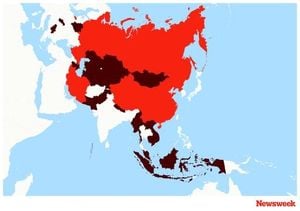Pune is grappling with a significant outbreak of Guillain-Barré syndrome (GBS), with over 100 confirmed cases reported, raising alarm among health officials and the public. The rise has been particularly alarming, with local media reporting at least 111 cases identified just within the last three weeks. Unfortunately, the outbreak has also witnessed casualties; two individuals have lost their lives due to this rare but serious autoimmune disorder.
Health authorities have revealed the first confirmed death linked to the outbreak involved a 41-year-old man who died on January 27, shortly after being diagnosed with GBS. Subsequent reports indicated the deaths of several younger individuals, including children, adding to the concerns surrounding this unexpected spike in cases.
According to local expert Dr. T Jacob John, who has studied GBS and other infectious diseases, the outbreak is being viewed as alarming. Dr. John noted, "The fact over 100 people have been diagnosed with GBS clearly indicates more than 5,000 must have contracted the Campylobacter infection," hinting at the likely cause being contaminated water supplies.
GBS is classified as a neurological disorder where the body’s immune system mistakenly attacks its own peripheral nerves, potentially leading to muscle weakness and paralysis. Symptoms typically start with tingling sensations or weakness in the legs, but can escalate to more severe manifestations, including respiratory failure.
Health officials have identified high levels of Escherichia coli bacteria found in local drinking water sources, indicating contamination likely from fecal matter. The local government is currently conducting tests and surveys to evaluate the drinking water supplies and address the health crisis. While GBS outbreaks are rare, they have been previously linked to various infections, and experts are investigating whether the drinking water was the initial vector for the widespread Campylobacter infection.
Recent reports have emerged of numerous cases throughout West Bengal as well, where children have been particularly affected. Reports from Kolkata suggest more than three children are currently receiving treatment for GBS at local hospitals, raising concerns among caregivers and health officials alike.
Despite the rising numbers, health experts are managing the situation cautiously. "While we observe approximately 20 to 25 cases of GBS each year, this clustering seems alarming, but we need to assess if it is merely coincidental or indicative of broader infectious trends," explained Mihir Sarkar, paediatric professor at Medical College, Kolkata. He emphasized the importance of differentiable awareness rather than inducing panic.
Local medical professionals noted the necessity to monitor these cases closely, particularly if the numbers continue to rise. "GBS is not contagious. It is often triggered by viral infections or poor water quality," reiterated Amit Haldar, director of neurology at Fortis Hospital Anandapur. Haldar classified GBS as post-infective, typically presenting after infections weaken patient immunity.
Authorities have taken steps to prepare hospitals across the region for potential surges. The West Bengal Health Department is enforcing stricter guidelines to facilitate rapid reporting and to improve the treatment infrastructure required for GBS, including ventilation support and the availability of immunoglobulin therapy.
Compounding the issue is the inadequate response from public health systems to manage such outbreaks effectively. Dr. Jacob noted the lack of swift action when initial Campylobacter cases were reported. He stressed, "When the first cases emerge, immediate steps should be taken to shut down water supplies until alternatives are provided.... Our public health systems must adapt to prevent these situations."
Recovery from GBS can take time, especially for severe cases requiring intensive care. Successful outcomes largely depend on early diagnosis and immediate treatment interventions, such as plasmapheresis and immunoglobulin therapies, which are fundamental to aiding recovery and minimizing long-term complications.
The outbreak has also highlighted infrastructural issues within the health sector, particularly the delayed recognition of public health threats. Experts are calling for reform to improve not only treatment capabilities but also proactive measures to address potential health emergencies before they escalate. Dr. Sanjay Pandey, head of the neurology department at Amrita Hospital, added, "The situation becomes even more dangerous when the patient’s lungs are involved," pointing out the risk factors associated with severe GBS.
While the state remains vigilant, the community has been advised to take precautions: drinking treated water, ensuring proper food hygiene to mitigate exposure to common triggers like poultry and unclean water sources. The imperative stands clear: to improve public health measures to provide both immediate response options and long-term strategies to avoid similar outbreaks.
The Guillain-Barré syndrome outbreak serves as another reminder of the interconnectedness of public health infrastructure and patient care. Without swift and effective action, medical professionals fear the case counts and related complications may extend well beyond the current statistics, leading to even more tragic outcomes for affected families.



